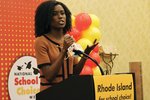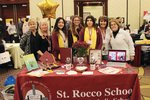


WARWICK — As part of National School Week, the National School Choice Fair was held at the Crowne Plaza on Sunday, Jan. 22.
During the event, booths were set up in the Plaza Ballroom for representatives of a variety of elementary, middle and high schools from throughout the state, including Catholic, Jewish, Christian, charter, trade and vocational schools.
Just outside the ballroom were booths associated with different organizations who helped to sponsor the event, including various groups that provide school textbooks, financial aid for students and school transportation.
The day’s events were organized by Ed Bastia, retired business administrator for the Diocese of Providence’s Catholic School Office, an instructor at Providence College, and the founder of Rhode Island Families for School Choice, the local branch of the National School Choice Awareness Foundation. The organization promotes the belief that parents should have access to as wide a choice of schools as possible, in order to find one that is best suited for their children, and often speaks out in favor of various government policies or financial programs that allow for this end.
Present at the event was Andrew Campanella, president and CEO of the National School Choice Awareness Foundation.
“The biggest goal for today is to let families from all across Rhode Island know that when it comes to their kids’ education, they have more choices than ever before,” Campanella said, describing the purpose of the day’s events.
“At school fairs like this, families can walk around and see dozens of different schools and other environments all in one place, decide which schools ultimately they want to visit, and get an idea of the possibilities that are out there,” he continued.
Campanella spoke of the importance of emphasizing school choice.
“Every child is unique, and all students are different. Kids learn in different ways. There is no cookie-cutter approach to education, just like there is no cookie-cutter approach to anything in life. We want families to be able to find learning environments that best meet their kid’s needs, talents, interests and also the challenges they face. For one kid that might be a traditional public school, for another family it might be a private school, a parochial school, a charter school.”
A strong belief in the positive impact of having a diversity of educational models and philosophies for parents to choose from was a major theme expressed by most people present, including Bastia.
“We are very, very pleased with the variety of schools that are here. … We have a wonderful variety of people who are supporting our endeavors,” said Bastia.
He noted that the chief goal of the school choice movement is to “try to get people to understand that we want to expand school choice in Rhode Island. We want parents to have more options,” he said.
“Parents should have the ability to make a choice in where their kids should go to school,” Bastia said, citing statistics that show that students are most successful when they are matched with a school that most closely meets their educational needs.
This was something echoed by keynote speaker Hera Varmah, the communications director for the National Federation for Children. In her speech, Varmah recalled how school choice played a big role in her and her siblings overcoming the poverty that defined their early childhood. The daughter of a Liberian father and a Jamaican mother, she was born in the United States but returned to Africa at a young age, spending part of her early childhood in the West African nation of Ghana. Since the general population of that nation is poor, and most educational institutions are privatized, most parents in Ghana do not send their children to school. Knowing how education is important for success, Varmah’s grandfather paid for her family to return to the United States in order to allow Varmah and her siblings to attend school. While in the United States, her parents initially sent her to public school, but made use of a tax-based scholarship initiative in their home state of Florida to send them to private school.
This tax-based scholarship allowed Varmah and her siblings to find a school that fit their needs, and each of them was enabled by this to attend and graduate college. She credits her and her siblings’ success to the opportunities she was given as a child to pursue alternative educational paths.
“Talk to your legislators, and tell them that these scholarships and these opportunities you see at this school choice fair really matter to the families,” Varmah said.
Present at the School Choice Fair was a number of Catholic schools.
“Everyone’s looking for something different, something new for their kids to be successful. We’re excited to be a part of it,” said Keith Kline, principal of St. Philip School, Greenville.
Many representatives of the Catholic schools spoke of how these institutions contribute greatly to the school choice movement by providing an educational context wherein students can learn values rooted in the Gospel. Lisa Lepore, the principal of St. Mary School in Cranston, noted how the purpose of Catholic education is “teaching the Gospel of faith, hope and love.”
“If you teach the kids those three essentials — faith, hope and love — it embodies who they are and opens up a whole new world for them,” Lepore continued.
Similar sentiments were expressed by the parents present.
“As parents, we like our children to have a Catholic education, and it’s up to us parents to decide what kind of education their children have,” said Ashley Codding, whose children attend St. Philip School. She added that the unique advantage of Catholic schools is the fact that “their primary focus is faith.”